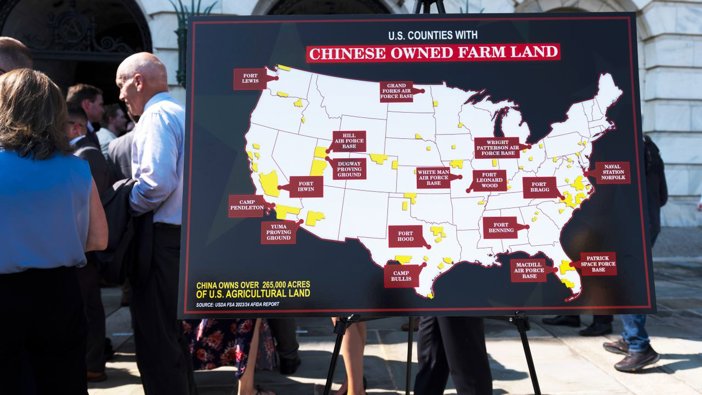
US Moves to Ban Chinese Ownership of Farmland
US launches plan to ban Chinese ownership of farmland and secure agriculture near military bases, citing national security.
National Farm Security Action Plan Targets Foreign Threats
The United States government has taken decisive steps to restrict Chinese and other foreign entities from acquiring American farmland, unveiling the National Farm Security Action Plan in Washington, D.C. on Tuesday. The comprehensive policy package, presented by the Department of Agriculture (USDA), aims to strengthen the nation’s food security and address growing concerns over foreign ownership of agricultural land—particularly near military installations.
USDA Secretary Brooke Rollins, announcing the initiative at a press event, warned that the agricultural sector is increasingly targeted by hostile regimes. “The farm’s produce is not just a commodity, it is a way of life that underpins America itself. And that’s exactly why it is under threat from criminals, from political adversaries, and from hostile regimes that understand our way of life as a profound and existential threat to themselves,” Rollins said. She cited Chinese acquisitions of US farmland and technology theft as key drivers behind the action plan, describing such moves as efforts to weaponize America’s agricultural inheritance.
Heightened Scrutiny Near Strategic Military Sites
Defense Secretary Pete Hegseth emphasized the importance of monitoring land purchases around military bases, stating, “As someone who’s charged with leading the Defense Department, I want to know who owns the land around our bases and strategic bases and getting an understanding of why foreign entities, foreign companies, foreign individuals might be buying up land around those bases.” The new plan will strengthen oversight and require assessments of land holdings near critical infrastructure.
Homeland Security Secretary Kristi Noem and Attorney General Pam Bondi echoed these concerns, highlighting recent incidents of suspected agroterrorism. Bondi noted that two Chinese nationals were recently arrested in Michigan for allegedly smuggling a known agroterrorism agent. Noem underscored the national implications, saying, “A country who cannot feed itself, cannot take care of itself, and cannot provide for itself, is not secure, and we have to be able to feed ourselves to make sure that no other country ever controls us.”
Noem pointed to her experience as governor of South Dakota, where she signed a law banning governments and entities from China, Iran, Cuba, North Korea, Venezuela, and Russia from purchasing farmland in the state. She accused hostile governments of intellectual property theft, unfair trade practices, and strategic acquisitions of US agricultural assets.
While numerous states already restrict land purchases by entities with ties to China and other foreign adversaries, the federal action marks a significant escalation. In 2021, over 383,000 acres of US farmland had links to China, though this figure has since declined, according to industry sources.
With the National Farm Security Action Plan, the US seeks to safeguard food production and national security by closing loopholes in land ownership and increasing transparency. Legislative and executive reforms outlined in the plan are expected to shape future policy, sending a clear message that foreign exploitation of American agriculture will not be tolerated.






